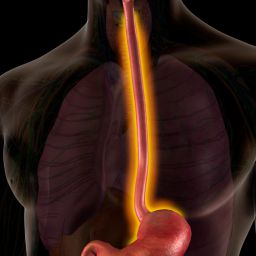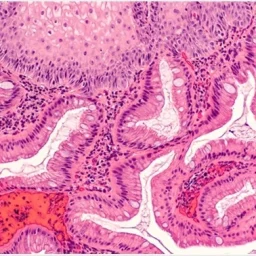
Understanding Esophageal Health
The esophagus is a muscular tube that carries food, liquid, and saliva from the mouth to the stomach. When healthy, it contracts rhythmically, allowing smooth passage of substances. However, the esophagus can become affected by various disorders such as acid reflux, esophagitis, esophageal spasms, and even cancer. These conditions can lead to discomfort, pain, and more severe complications if not managed properly.
Common Esophageal Issues

- Gastroesophageal Reflux Disease (GERD): Chronic acid reflux, where stomach acid rises into the esophagus, causing irritation and damage.
- Esophagitis: Inflammation of the esophagus, which can be caused by infections, acid reflux, or allergic reactions.
- Achalasia: A condition where the muscles of the esophagus become weak, impairing the movement of food.
- Barrett’s Esophagus: A change in the tissue lining the esophagus, often due to chronic acid reflux, which may increase the risk of esophageal cancer.
- Esophageal Spasms: Abnormal contractions of the esophagus that lead to pain and difficulty swallowing.
Supporting the esophagus through natural remedies can help alleviate symptoms, prevent the progression of these conditions, and enhance overall digestive health.
Dietary Remedies for Esophageal Health
A healthy diet is one of the most effective ways to maintain esophageal health. Certain foods can soothe the esophagus, while others can trigger inflammation and worsen symptoms. Here are several dietary recommendations to support esophageal health:
1. Alkaline Foods
Foods that are naturally alkaline help neutralize stomach acid, which can soothe the esophagus, especially for individuals suffering from acid reflux and GERD. These foods are non-acidic and can prevent further irritation.
- Examples: Leafy greens (spinach, kale), cucumbers, melons, bananas, and avocados.
- Why They Work: Alkaline foods help balance the body’s pH levels and reduce acidity in the stomach, preventing reflux and soothing the esophageal lining.
2. Ginger
Ginger is known for its anti-inflammatory properties and has been used for centuries as a digestive aid. It can help reduce acid reflux symptoms and alleviate nausea, which often accompanies esophageal discomfort.
- How to Use It: Fresh ginger can be added to teas or smoothies, or consumed in small slices to soothe inflammation in the digestive tract.
- Why It Works: Ginger acts as a natural anti-inflammatory, soothing the esophagus and reducing the likelihood of reflux or irritation.
3. Slippery Elm
Slippery elm is a popular herbal remedy that has been used for centuries to soothe digestive issues. It contains mucilage, a gel-like substance that coats and protects the mucous membranes in the esophagus and stomach.
- How to Use It: Slippery elm can be consumed as a tea or in supplement form.
- Why It Works: The mucilage in slippery elm helps protect the esophagus from acid, reduces inflammation, and promotes healing.
4. Aloe Vera
Aloe vera is known for its healing properties and is commonly used to treat burns and wounds. It can also help soothe inflammation in the esophagus, particularly for people with acid reflux or esophagitis.
- How to Use It: Aloe vera juice can be consumed in small amounts before meals to calm the digestive tract.
- Why It Works: Aloe vera has anti-inflammatory properties that help heal the esophagus and reduce acid reflux symptoms.
5. Fiber-Rich Foods
Eating fiber-rich foods supports overall digestive health and can help prevent constipation, which can worsen acid reflux symptoms. Fiber helps regulate bowel movements and prevents pressure buildup that can force acid back into the esophagus.
- Examples: Whole grains, oats, apples, carrots, and lentils.
- Why It Works: Fiber helps with digestion and ensures smooth food movement through the digestive system, reducing the likelihood of reflux.
6. Probiotic Foods
Probiotics are beneficial bacteria that help maintain a healthy gut microbiome. A balanced gut can support esophageal health by reducing inflammation and improving overall digestive function.
- Examples: Yogurt, kefir, sauerkraut, kimchi, and miso.
- Why They Work: Probiotics improve digestion and help balance the gut, reducing the risk of infections, acid reflux, and inflammation.
Herbal Remedies for Esophageal Health
Herbal remedies can complement dietary changes by providing natural anti-inflammatory and soothing effects on the esophagus. Below are some herbs known for supporting esophageal health:

1. Chamomile
Chamomile is an herb with soothing properties that can help relax the muscles of the esophagus and relieve heartburn and other symptoms of acid reflux. It also has anti-inflammatory effects, making it useful for esophagitis.
- How to Use It: Chamomile tea is a popular choice, but it can also be taken as a supplement.
- Why It Works: Chamomile helps relax the muscles of the digestive system, reducing spasms, discomfort, and acid reflux symptoms.
2. Marshmallow Root
Marshmallow root contains mucilage, which is similar to slippery elm. It helps coat the digestive tract and protects the esophagus from irritation caused by stomach acid or other inflammatory conditions.
- How to Use It: Marshmallow root can be consumed as a tea or in supplement form.
- Why It Works: The mucilage in marshmallow root soothes and protects the esophagus, reducing inflammation and promoting healing.
3. Licorice Root
Licorice root has been used in traditional medicine to treat digestive disorders. It helps protect the mucous lining of the esophagus and reduces inflammation caused by acid reflux and other conditions.
- How to Use It: Licorice root can be consumed as a tea or in supplement form. However, it should be used in moderation, as excessive consumption may lead to side effects.
- Why It Works: Licorice root promotes the healing of the esophagus by reducing inflammation and providing a protective coating to the mucous membranes.
4. Fennel Seeds
Fennel seeds are widely used to support digestive health. They can help relieve bloating, gas, and indigestion while soothing the stomach and esophagus.
- How to Use It: Fennel seeds can be chewed directly or made into tea.
- Why It Works: Fennel seeds help relax the muscles of the digestive tract, reduce bloating, and alleviate symptoms of indigestion and reflux.
Lifestyle Modifications to Support Esophageal Health
In addition to natural remedies and dietary changes, lifestyle adjustments can significantly improve esophageal health. Here are several lifestyle modifications that can support a healthy esophagus:
1. Eat Smaller, More Frequent Meals
Consuming large meals can increase pressure on the stomach and lead to acid reflux. Eating smaller, more frequent meals can help prevent this.
- Why It Works: Smaller meals reduce the likelihood of overeating and lower the pressure on the stomach, which can help prevent reflux and esophageal irritation.
2. Avoid Eating Before Bedtime
Lying down after eating can promote acid reflux, as gravity is no longer helping to keep food and acid in the stomach. Avoid eating at least two to three hours before going to bed.
- Why It Works: Allowing time for digestion before lying down reduces the risk of acid reflux, allowing the stomach to empty before you sleep.
3. Elevate the Head of Your Bed
Elevating the head of the bed can help prevent nighttime reflux by allowing gravity to keep stomach acid from rising into the esophagus.
- Why It Works: Raising the head of the bed by about 6-8 inches reduces the likelihood of acid reflux during sleep.
4. Maintain a Healthy Weight
Excess weight, particularly around the abdomen, can put pressure on the stomach and lead to acid reflux and other esophageal disorders.
- Why It Works: Maintaining a healthy weight reduces abdominal pressure and minimizes the risk of GERD and other esophageal conditions.
5. Quit Smoking and Limit Alcohol
Smoking and excessive alcohol consumption can irritate the esophagus and increase the risk of acid reflux and other esophageal issues.
- Why It Works: Smoking and alcohol weaken the lower esophageal sphincter, making it easier for acid to flow back into the esophagus.
6. Manage Stress
Chronic stress can exacerbate symptoms of acid reflux and other digestive issues. Practicing relaxation techniques like meditation, yoga, or deep breathing can help manage stress.
- Why It Works: Reducing stress can minimize the occurrence of reflux and improve overall digestive function.
Supporting esophageal health is essential for preventing and managing common disorders such as GERD, esophagitis, and achalasia. While medical intervention is often necessary, natural remedies can play a significant role in soothing the esophagus, reducing inflammation, and promoting healing. A combination of dietary changes, herbal remedies, and lifestyle modifications can help maintain a healthy esophagus and alleviate the discomfort associated with esophageal diseases.
Incorporating these natural approaches can enhance overall digestive health, reduce the need for medications, and improve the quality of life for individuals affected by esophageal conditions. However, it is always important to consult with a healthcare provider before implementing any natural remedies, especially for those with pre-existing health conditions or ongoing treatment.


